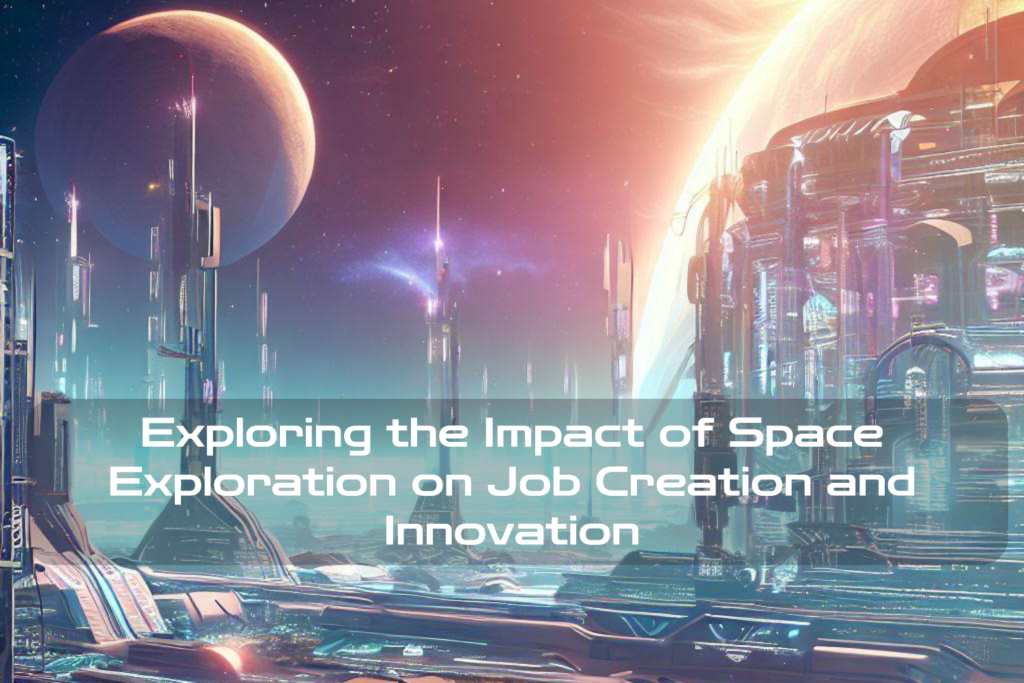The Final Frontier: How Space Exploration Boosts the Economy
From landing on the moon to sending rovers to Mars, space exploration has captured our imaginations for generations. But did you know that it also has a significant impact on our economy? In this article, we’ll explore how space exploration has led to job creation and innovation, resulting in economic growth.
The Impact of Space Exploration on the Economy
The space industry is a major player in the global economy. In 2019, it was estimated to be worth $423.8 billion and is projected to exceed $1 trillion by 2040. This industry encompasses a wide range of activities, from satellite launches and telecommunications to scientific research and interplanetary exploration.
One of the most significant impacts of space exploration on the economy is job creation. According to a report by the Space Foundation, the global space workforce totalled 200,000 in 2022, with an estimated 5-10% annual growth rate.
The jobs created by the space industry span multiple disciplines such as engineering, manufacturing, data analysis and more. Furthermore, these jobs are often high-paying and require advanced degrees or specialized training.
The Link Between Space Exploration and Economic Growth
Space exploration serves as an engine for economic growth through job creation and innovation. As we will discuss in this article, investing in space technology drives progress not only within its own industry but also across other sectors such as healthcare or transportation.
In fact, some of today’s most commonly used technologies were developed for use in space before being adapted for use on Earth; GPS systems are just one example.
Job Creation

The Space Industry’s Impact on Job Creation
Space exploration has led to a significant increase in job creation across numerous industries. According to the U.S. Bureau of Labor Statistics, the space industry employed over 211,000 workers in 2019.
This number is expected to grow significantly as private companies like SpaceX and Blue Origin continue to ramp up their operations. In addition to direct jobs within the space industry, space exploration has also created job opportunities in related industries such as technology and manufacturing.
For example, NASA’s plans for a manned mission to Mars have spurred innovation in areas like life support systems, robotics, and materials science. These innovations have practical applications beyond just space travel and can be utilized in countless other industries.
Companies Involved in Space Exploration and Their Job Creation Impact
Many companies are involved in space exploration, each with its own unique impact on job creation. SpaceX is perhaps the most well-known private company involved in space exploration today.
Founded by Elon Musk, SpaceX employs over 7,000 people who work on everything from rocket design to spacecraft manufacturing.
Boeing is another major player in the field of aerospace and defense technology with over 165 years of experience.
The company has played a significant role in NASA’s missions since the 1960s and employs over 143,000 people worldwide.
Virgin Galactic is another exciting company that has recently entered the field of commercial space travel.
The company aims to make suborbital flights available for paying customers while also advancing supersonic travel research. While still a relatively small company with just under 1,000 employees at present, Virgin Galactic’s mission holds enormous potential for job growth both within its own workforce as well as with partnering organizations developing new technologies and infrastructure necessary for future commercial travel ventures.
Creating Jobs Beyond The Space Industry
Not only has space exploration created jobs within the industry, it has also led to job creation in related fields such as technology, manufacturing, and environmental science.
For example, NASA’s Artemis program to land the first woman and next man on the Moon by 2024 is expected to create numerous opportunities for private companies to partner in developing new technologies necessary for deep space exploration.
The development of these technologies can then be utilized in a variety of industries beyond just those working in space exploration.
Furthermore, with plans for lunar settlements and research stations underway, there will be a need for workers skilled in architecture, construction, electrical engineering, and other trades both on Earth and potentially on the moon itself – leading to the creation of new jobs not only in direct support of space travel but also through businesses that supply the products or services needed by these workers.
Overall, space exploration has created job opportunities at all levels – from highly trained scientists and engineers down to labourers working on assembly lines. These positions have spurred economic growth worldwide, even as new areas of research and development continue to open up new avenues for innovation.
Innovation: Driving Technological Advancements

Space exploration has always been a catalyst for technological advancement.
In order to explore the unknown, scientists and engineers must develop new tools and systems that can withstand the harsh conditions of space. As a result, the space industry has been responsible for some of the most significant technological advancements in human history.
One example of this is GPS (Global Positioning System), which was initially developed by the United States Department of Defense for military purposes. However, it was later made available for civilian use and has become an essential tool for navigation across the globe.
GPS technology has enabled us to navigate with pinpoint accuracy and has revolutionized industries such as transportation, logistics, and agriculture. Another example of how space innovation drives progress in other industries is through materials science.
Spacecraft must be designed to withstand extreme temperature changes, radiation exposure, and other harsh conditions found in space. As a result, materials used on spacecraft have led to advancements in everything from medical implants to sports equipment.
Practical Applications Developed from Space Technology

The list of spin-off technologies resulting from space exploration is extensive. NASA’s Technology Transfer Program alone has resulted in over 1,800 patented technologies that have been used to improve life on Earth.
One notable development is water filtration technology. NASA’s research into recycling water on spacecraft led to the development of advanced water filtration systems that are now commonly used around the world.
Other developments include solar energy technology, fire-resistant materials for buildings and vehicles, and even scratch-resistant coatings for eyeglasses.
In addition to directly benefiting consumers through these practical applications, innovations developed through space exploration have also driven progress across many industries, including healthcare, telecommunications, and energy production.
The Ripple Effect: Innovation Inspires Further Innovation

The innovation resulting from space exploration not only benefits individual industries but also inspires further innovation across multiple fields. The development of new materials and technologies frequently leads to entirely new industries and applications that were previously unimaginable.
For example, NASA’s research into 3D printing to create spacecraft components led to the development of 3D printing technology for medical applications such as prosthetics.
Similarly, advances in robotics and artificial intelligence have been driven by the need for autonomous systems on spacecraft.
Furthermore, the collaboration required between governments, private companies, and academic institutions in order to advance space exploration has led to cross-industry partnerships that drive innovation across multiple fields. The transfer of knowledge and expertise between these organizations has resulted in remarkable advancements that benefit society as a whole.
Economic Impact

Exploring the Economic Benefits of Space Exploration
The economic impact of space exploration is a topic that has been debated for many years.
Critics argue that investing in space exploration is too expensive and diverts resources from more pressing needs on Earth. However, supporters of the space industry point out that the benefits extend far beyond scientific discovery and exploration.
In fact, the economic benefits resulting from job creation and innovation may be among the most significant impacts. One major economic benefit of space exploration is job creation.
The industry employs scientists, engineers, technicians, and other highly skilled professionals who earn high salaries and contribute to local economies. For example, NASA’s Kennedy Space Center in Florida employs over 8,000 people and generates millions of dollars in revenue for surrounding businesses.
Additionally, private companies like SpaceX have created thousands of jobs through partnerships with NASA and other organizations. Another economic benefit is innovation resulting from space exploration research.
Government Investment Drives Economic Growth
Although some argue that government investment in space exploration diverts resources from other needs on Earth, others point out that government funding can actually drive economic growth. Government investment provides the critical funding necessary for research and development efforts of new technologies, which could lead to breakthroughs across multiple industries.
Additionally, government investment can stimulate private sector involvement as well as drive collaborations between academia & industry leaders, which leads to more innovation but also creates new opportunities within emerging markets.
Regions That Have Experienced Economic Growth Due To Their Involvement With The Space Industry
Regions around the world have experienced significant economic growth due to their involvement with the space industry.
One example is Houston, Texas, home to NASA’s Johnson Space Center.
The center employs thousands of scientists and engineers and generates billions of dollars in economic activity for the region. Additionally, companies like Boeing and Lockheed Martin partner with NASA in Houston, creating even more job opportunities.
Another example is the Space Coast region of Florida, which has seen significant economic growth due to its proximity to Kennedy Space Center. This region has become a hub for aerospace manufacturing, attracting companies like Blue Origin and OneWeb Satellites.
Overall, while some may argue that investment in space exploration is frivolous or unnecessary, there is no denying the significant economic benefits this industry provides. It not only creates jobs but also stimulates innovation, which drives economic growth across multiple industries.
Challenges Facing the Space Industry

Space exploration is not without its challenges, and the industry faces several obstacles that must be addressed to continue its growth. One of the biggest challenges is funding. Space missions are incredibly expensive, and securing enough funding for them can be difficult.
This has led to many space programs being cancelled or delayed due to a lack of funding. Another challenge facing the space industry is safety concerns.
Space travel is a risky endeavor, and despite advancements in technology, there are still dangers that cannot be completely eliminated. Accidents like the 1986 Challenger disaster and the 2003 Columbia disaster serve as reminders of these risks.
These accidents not only cause loss of life but also result in financial setbacks for space programs. Regulation is also a challenge facing the space industry.
There are few laws governing space exploration, which can lead to issues with ownership and liability. It’s important for governments to establish clear regulations that protect both companies and individuals involved in space exploration.
Potential Future Opportunities for Job Creation
Despite these challenges, there are still many opportunities for job creation within the space industry. One potential area of growth is satellite technology.
Satellites play an essential role in communication, navigation, weather forecasting, and more.
As demand for satellite services increases, so will job opportunities related to their development, launch, operation, and maintenance. Another area of opportunity involves asteroid mining, – extracting resources from asteroids such as water or minerals like platinum-group metals, which could help us reduce our dependence on Earth’s finite resources such as oil reserves or coal deposits.
Commercial spaceflight presents another exciting opportunity for job creation within the industry – this includes both tourism (space tourism) as well as transporting cargo into orbit (space logistics). With private companies like SpaceX pushing boundaries in this field we may see some amazing technological advancements come out soon.
The Future of Innovation Within The Space Industry
Innovation will continue to drive growth within the space industry, and we can expect to see many exciting new advancements in the coming years.
One area of focus is reusable rockets, which could significantly reduce the cost of space travel by allowing rockets to be used multiple times.
Another area of innovation is 3D printing. This technology is already being used on the International Space Station to print tools and parts as needed.
As this technology advances, we may see entire space structures being printed in orbit.
AI and robotics are also poised to play a significant role in future space exploration.
Robots can be sent to explore hostile environments where it may be too dangerous for humans, such as Mars or Jupiter’s moons. AI could also help automate tasks like navigation or data analysis.
Overall, while there are challenges facing the space industry, there are also many opportunities for job creation and innovation within it. As advancements continue to be made, we can expect exciting new breakthroughs in space exploration that will benefit us all here on Earth.
Final Thoughts

We have explored the significant job creation and innovation resulting from space exploration, and its resulting economic growth.
Job creation in space-related industries such as aerospace technology, satellite manufacturing, and launch services has led to employment opportunities for thousands of people worldwide.
Furthermore, innovation in the space industry has led to breakthroughs in technology that have practical applications beyond space exploration. The economic impact of these developments cannot be understated.
Investment in the space industry has resulted in substantial economic growth for many regions worldwide. The creation of high-paying jobs has benefited local economies by generating revenue through increased consumer spending and tax revenues.
While challenges remain for the space industry such as funding constraints and safety concerns, future opportunities for job creation and innovation within the industry seem boundless. With private companies taking a more active role in space exploration alongside government agencies, there is still much that can be accomplished to benefit humanity.
It is clear that space exploration has had a significant positive impact on job creation and innovation, which has led to sustained economic growth over time. This trend shows no signs of slowing down anytime soon, with new technological advancements being made regularly that further expand our understanding of our universe while also providing benefits here on Earth.

C M, a seasoned editor, journalist, and consultant, is deeply fascinated by the convergence of technology, space, and the future of humanity.
With a particular interest in transhumanity, futurology, and the philosophical and ethical dimensions of these domains, C M serves as the lead contributor to SpaceSpotlight and TranscendSphere.
When not penning insightful articles on these rapidly evolving fields, C M indulges in their love for podcasts and books, proudly embracing their status as a ‘Happy Nerd Extraordinaire!’



